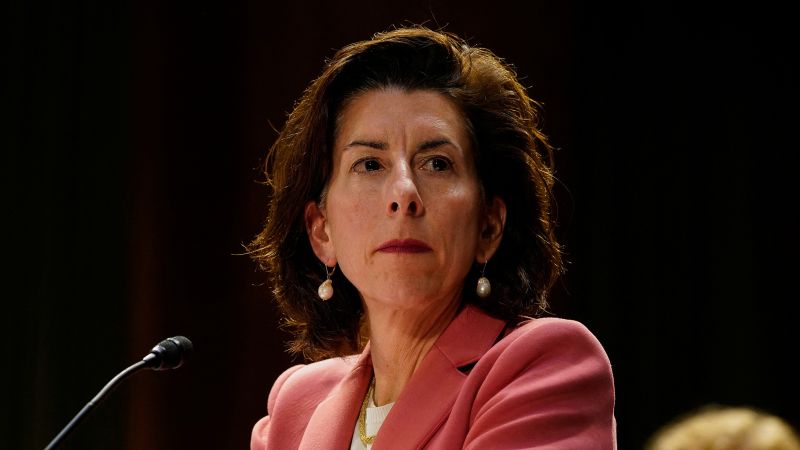
CNN
—
The US Commerce Department on Monday will propose a ban on the sale or import of smart vehicles that use specific Chinese or Russian technology because of national security concerns, according to US officials.
A US government investigation that began in February found a range of national security risks from embedded software and hardware from China and Russia in US vehicles, including the possibility of remote sabotage by hacking and the collection of personal data on drivers, Secretary of Commerce Gina Raimondo told reporters Sunday in a conference call.
“In extreme situations, a foreign adversary could shut down or take control of all their vehicles operating in the United States, all at the same time, causing crashes (or) blocking roads,” she said.
The rule would not apply to cars already on the road in the US that already have Chinese software installed, a senior administration official told CNN. The software ban would take effect for vehicles for “model year” 2027 and the hardware ban for “model year” 2030, according to the Commerce Department.
The proposed regulatory action is part of a much broader struggle between the United States and China, the world’s two biggest economies, to secure the supply chains of the key computing technology of the future, from semiconductors to AI software.
China, in particular, has invested heavily in the connected car market, and inroads made by Chinese manufacturers in Europe have worried US officials.
The Chinese government has its own concerns about the data gathered by Tesla (TSLA) vehicles, and some Chinese government authorities have barred the vehicles from entering their compounds, CNN has previously reported.
The Commerce Department’s proposed rule is on “connected vehicles,” a broad term for virtually any modern car, bus or truck that uses network connections for roadside assistance, satellite communications or a range of other features. It covers hardware and software that interact with key technology that allows a vehicle to communicate with the outside world, such as Bluetooth, WiFi and cellular technology.
There will be a 30-day public comment period on the proposed rule and the Commerce Department aims to issue a final regulation before the end of the Biden administration, a senior administration official told reporters On Monday, the Biden administration will also release an economic analysis of the expected costs for automakers and consumers to comply with the proposed rule, the official said.
Raimondo said Monday’s announcement was not a protectionist move, a charge made by Chinese critics.
“This is not about trade or economic advantage,” Raimondo said. “This is a strictly national security action.”
“If (China) or Russia, for example, could collect data on where the driver lives or what school their kids go to, where (their) doctor is, that’s data that would leave that American vulnerable,” she said.
US officials are concerned that electric charging stations and other infrastructure outfitted with certain hardware or software could be exploited by hackers with ties to China, Russia or other foreign powers.
“We’ve already seen ample evidence of the PRC pre-positioning malware on our critical infrastructure for the purpose of disruption and sabotage,” White House national security adviser Jake Sullivan told reporters on the conference call, using an acronym for the Chinese government. If millions more smart cars with vulnerable, Chinese-made tech are on US roads, “the risk of disruption and sabotage increases dramatically,” he said.
The Chinese government has denied US allegations that its hackers have embedded in US infrastructure.
“China opposes the US’s broadening of the concept of national security and the discriminatory actions taken against Chinese companies and products,” said Lin Jian, spokesman for China’s Foreign Ministry, in a statement. “We urge the US side to respect market principles and provide an open, fair, transparent, and non-discriminatory business environment for Chinese enterprises.”
It’s the latest example of the Commerce Department attempting to use its broad regulatory authority to shield US consumers from foreign-made software that is deemed a national security threat.
In June, the department banned the sale and provision of certain products and services made by Russian cybersecurity firm Kaspersky Lab, whose anti-virus software is used by hundreds of millions of people around the world.
Supporting American autoworkers
The proposed ban comes on the same day that the White House announced a number of new initiatives aimed at supporting autoworkers, particularly aimed at the key battleground state of Michigan – a crucial state in President Joe Biden’s victory in 2020. Vice President Kamala Harris’ campaign believes Michigan is a must-win in November.
The other initiatives announced by the White House on Monday include $1 billion in financing for small- and medium-sized auto suppliers, a new pilot program to train workers in the state’s most populous county for jobs in the automobile supply chain, funding to support more training for workers to install electric vehicle chargers and another initiatives across the state.
It’s a broad series of moves aimed at one of Biden and Harris’ key groups of supporters: Unionized auto workers in the Midwest. Last year, Biden became the first president to visit a picket line during the United Auto Workers’ strike and has made courting union members a critical part of his political message while he’s been in the White House.
Harris has taken up that mantle and has already made multiple trips to Michigan after she took over the top of the ticket. The White House fact sheet announcing the new initiatives notably includes a quote from the vice president touting the programs. It includes zero quotes from Biden.
“I believe in an economy where everyone has a chance to compete and a chance to succeed. Investing in the ambitions and aspirations of our people is the best way to grow the American economy and the middle class,” Harris said in the statement. “Yet for far too long, we have seen lack of investment in communities across America and profound obstacles to economic opportunity—including in communities with historic manufacturing expertise such as Detroit.”
CNN’s Shawn Deng contributed to this report.
